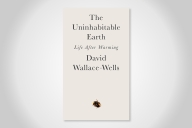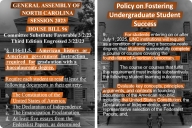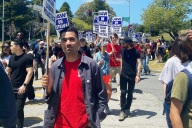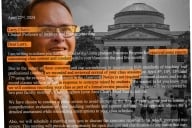You have /5 articles left.
Sign up for a free account or log in.
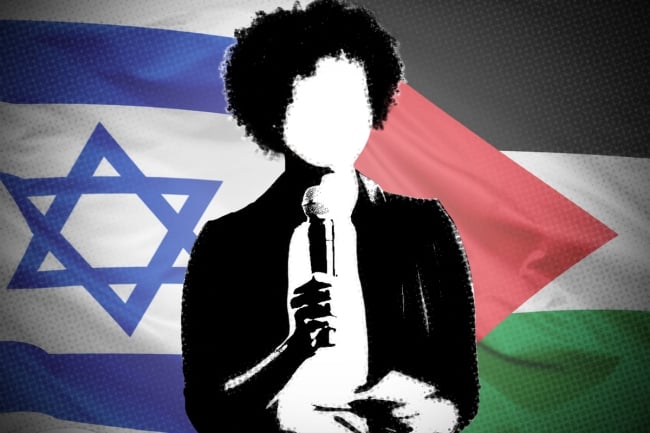
Faculty members have been investigated and punished for their speech about the war in Gaza.
Maria Renata Gangemi, an associate professor of communication arts, allegedly shared on Facebook last month a political cartoon of an arm with red and white stripes, connected to a gloved hand with the white and blue colors and Star of David from Israel’s flag.
The hand wielded a bloodied butcher’s knife, which had sliced thrice through the bloodied body of a baby wearing Palestinian colors. Each time the knife went through the infant, it cut into the “International Law” book the corpse lay atop.
It’s unclear when, or whether, she actually posted the cartoon. It doesn’t currently appear on a Facebook profile with her photo and the name “Renata Gangemi,” and she neither confirmed nor denied posting it when Inside Higher Ed asked.
The important date is Nov. 26, when StopAntisemitism shared Gangemi’s alleged Facebook post on X—alongside her photo, her position and her workplace, Ramapo College of New Jersey. “Imagine being a Jewish student of Gangemi’s?” StopAntisemitism wrote.
That group, which selects an “Antisemite of the Week” and year, has over 285,000 followers on X. By the next day, Ramapo College had launched an investigation “regarding social media posts from a member of our community,” the college said.
Social media users piled on the criticism. On Nov. 29, Josh Gottheimer, a Democratic New Jersey congressman, shared StopAntisemitism’s post with his own message on X. “I was alarmed and angered by this antisemitic, anti-Israel post from a Ramapo College of New Jersey professor,” Gottheimer wrote. “I had a constructive conversation with Ramapo College’s President & they are investigating the matter. We must keep all students safe on campus amid the rise of hate.”
Last week, Gangemi responded to Inside Higher Ed’s requests for comment with a one-sentence email: “As you may know, an investigation is underway and I don’t want to interfere in any way.” A Ramapo spokesperson wrote to Inside Higher Ed, “We cannot comment on the outcome or status of investigations as they are confidential.”
The Ramapo spokesperson further wrote, “In accordance with the NJ State Policy Prohibiting Discrimination in the Workplace, we launched an investigation within 48 hours of being alerted that the activity may fall under the State policy,” which can be violated “even if there was no intent on the part of an individual to harass or demean another.”
Canary Mission, whose website says it “documents individuals and organizations that promote hatred of the USA, Israel and Jews on North American college campuses and beyond,” added Gangemi to its public database of professors it has accused of antisemitism.
The Facebook post was hardly an isolated incident. The Oct. 7 Hamas attack and Israel’s retaliatory bombardments of the Gaza Strip, which have killed thousands of civilians, escalated the Israel-Palestine conflict not just in the Middle East and international politics, but also on American college campuses. There’s been less focus on faculty free speech controversies compared to student protests—and compared to controversies over elite university presidents’ alleged failure to sufficiently respond to campus antisemitism and to House Republicans’ questions about it.
But since that October day, academic freedom and free speech advocates have seen multiple examples of faculty members being swiftly investigated and sometimes punished for their statements on the crisis—often after they blew up in social and conservative media.
Inside Higher Ed reviewed more than a dozen cases in which faculty speech has been censored, investigated or punished by universities or professional associations. Most of the controversial speech has involved pro-Palestinian viewpoints, and most of the fallout has stemmed from statements outside the classroom, at protests or on social media.
A lot of universities are on a bit of a hair trigger when it comes to faculty speech.”
—Keith Whittington, Academic Freedom Alliance
Keith Whittington, a Princeton University politics professor and founding chair of the Academic Freedom Alliance, which supports faculty free expression, said it’s hard to gauge the total scope of the issue, or even whether universities are investigating and punishing more pro-Palestinian than pro-Israeli speech. Unlike a professor’s social media post going viral, or comments they made at a rally going viral, in-class statements that generate complaints are often investigated and disciplined internally without coming to public notice, he said.
Universities—perhaps due to divergent policies influenced by whether they’re private or public, to unique state laws, or to individual administrators’ differing appetites for weathering outside criticism—have responded in varied ways to controversies over faculty speech on the war. Some have moved swiftly to investigate faculty members, and even remove professors from classrooms, when their words stir controversy—too swiftly, according to some.
“A lot of universities are on a bit of a hair trigger when it comes to faculty speech on this particular issue at the moment,” Whittington said. In the present crisis, he said, universities seem to feel they can’t just wait to see whether a flare-up blows over. They know they’re being watched by pressure groups and, in some cases, receiving pressure from donors and politicians like Gottheimer.
“Universities seem to be sort of skipping that stage of issuing [a] pro forma defense of free speech and waiting to see what happens,” he said.
Kristen Shahverdian, senior manager in free expression and education for PEN America, said she thinks universities have an obligation to at least look into complaints, though that doesn’t have to always lead to “a full-on investigation.”
“Having a process that appears to pull faculty from the classroom or clamp down on speech first, even when that might be corrected later, can do real harm to free expression and academic freedom,” she said. “It can kind of cast a chill on speech.”
It’s too early to tell whether the outcomes of the investigations and punishments since Oct. 7 will be different than for past controversies. But it’s clear the war is testing how tolerant universities really are of free speech when they’re under immense public—and political—pressure to take action.
Social Media Storms
Multiple investigations into faculty speech have started with blowups on social media.
“The Israeli-Palestinian issue is one in which lots of people are paying attention to it and lots of people have very intense feelings about it, and that combination, I think, is likely to generate a lot of these kind of harassment campaigns in reaction to controversial speech,” Whittington said.
Another aspect of this free speech conflagration that makes it “somewhat unusual” compared to past controversies, he said: “There are examples of rhetoric that is more violent and more extreme on this issue.”
On Oct. 10, three days after Hamas’s terrorist attack on Israeli civilians, an assistant professor and undergraduate faculty adviser at the University of California, Davis, allegedly posted emojis of a knife, a hatchet and blood drops on X, with a threatening message attached.
“One group of ppl we have easy access to in the US is all these zionist journalists who spread propaganda and misinformation,” Jemma Decristo allegedly wrote. “They have houses w addresses, kids in school … they can fear their bosses but they should fear us more.”
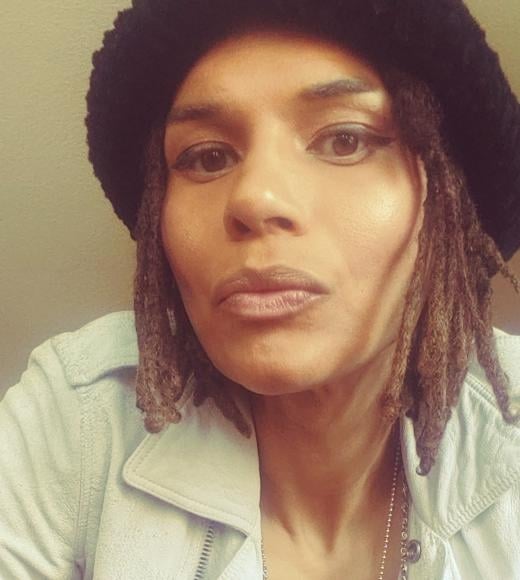
University of California, Davis
Decristo’s account no longer exists, but X users spread a screenshot. Soon national media outlets were writing about the screenshot, and public calls rang out for Decristo to be fired.
Gary S. May, UC Davis’s chancellor, said in an Oct. 19 statement that he found “the comments revolting in every way.” He wrote that there are “established policies and procedures for handling faculty discipline” but “we are not permitted to share” details publicly.
“We can confirm that the provost will refer this matter to the appropriate campus departments that investigate harassment, discrimination and faculty conduct, in consultation with legal counsel regarding First Amendment rights,” May wrote. “The public expression of opinions, even those opinions considered controversial or abhorrent, enjoy a high level of protection under the First Amendment.”
The university hasn’t provided further comment on this incident since. Inside Higher Ed was unable to reach Decristo. But her name no longer appears on the faculty page for the university’s American Studies department.
Asked about that situation, Shahverdian, with PEN America, said context matters. “A university can speak out against that speech and be really clear to their community that they think it’s wrong, whether or not it has … gone into a civil rights violation,” which may require investigation, she said.
Not all universities faced with social media condemnation have announced investigations when faculty opinions generate complaints. Yale University, in one case, has publicly defended a faculty member’s freedom of expression.
Zareena Grewal, associate professor of American studies, ethnicity, race and migration, and religious studies, faced a student petition calling for her firing after she allegedly posted on X on the day of Hamas’s attack, “Prayers for Palestinians. Israeli [sic] is a murderous, genocidal settler state and Palestinians have every right to resist through armed struggle, solidarity #FreePalestine.”
Fox News, The National Review and other conservative and nonconservative outlets reported on that post, as well as another one Grewal allegedly posted the same day: “Settlers are not civilians. This is not hard.”
In an October email to Inside Higher Ed, Grewal pointed to another tweet “in which I clearly am not a Hamas supporter.” That tweet dealt with Hamas’s killing of Thai workers in Israel. She has declined further comment.
In an email to Inside Higher Ed, a Yale spokesperson wrote, “Yale is committed to freedom of expression, and the comments posted on Professor Grewal’s personal accounts represent her own views.” The spokesperson noted Yale president Peter Salovey “condemned the attacks on civilians by Hamas and called on all members of the Yale community to ‘treat one another with compassion and to sustain a community of respect.’”
That shouldn’t be litigated on Fox News.”
—Isaac Kamola, Faculty First Responders
But a private Southern university at least investigated a now former professor for her speech, which allegedly defended and celebrated the Hamas attack in a manner similar to Grewal’s. And the university may have gone further than investigating.
Emory University never specified what remarks from Dr. Abeer AbouYabis, an assistant professor in the university’s hematology and medical oncology department, it took issue with. On Oct. 16, StopAntisemitism shared on X a screenshot of an undated alleged post from Dr. AbouYabis that said, “They got walls we got gliders. Glory to all resistance fighters.” Media reports followed.
The following day, Oct. 17, Emory condemned unspecified comments by Dr. AbouYabis as “antisemitic” and said it “immediately placed this individual on administrative leave pending an internal investigation.” On Oct. 18, the Foundation for Individual Rights and Expression, defended Dr. AbouYabis on X, writing that Emory’s “punishment sends a deeply chilling message for extramural faculty speech on contentious political issues.”
The university said in a Nov. 9 statement that “Dr. Abeer AbouYabis is no longer employed or practicing at Emory, including the Winship Cancer Institute.” Inside Higher Ed was unable to reach Dr. AbouYabis, and Emory would not say whether she resigned or was fired.
Isaac Kamola, an associate political science professor at Connecticut’s Trinity College and director of Faculty First Responders, a group funded by the American Association of University Professors, said his organization monitors about a dozen conservative websites that write about higher education and offers aid to the faculty members mentioned in these articles.
“Attacks against faculty have always disproportionately affected faculty of color and queer faculty and women and female faculty—we’re seeing that that is remaining the same,” Kamola said. But he said this “right-wing media ecosystem” shifts the issues it targets faculty members over, and in the last two months these websites have had “a sharp increase in attacks on faculty who express solidarity with Palestine, who express criticisms of the state of Israel.”
“What I think is making the present moment so difficult for academic freedom is that there has been in the last decade or so the creation of this right-wing media ecosystem that focuses specifically on higher education and creates these pipelines” that elevate local stories into national ones, Kamola said. Some faculty speech may have crossed the line, he said, but disputes over faculty speech should be litigated by faculty committees, per AAUP policies.
“That’s something that shouldn’t be litigated on Fox News and shouldn’t be litigated by billionaire donors,” he said.
Rallies Rouse Controversy
At an off-campus Oct. 15 rally, Russell Rickford, a Cornell University associate history professor, said Hamas’s attack “exhilarated” him. On Oct. 16, Libs of TikTok, an X account with roughly 2.7 million followers created by Chaya Raichik, shared, alongside other accounts, a 24-second video of Rickford’s comments.
The same day, The Cornell Daily Sun student newspaper uploaded a longer, but still incomplete, video of his remarks that provided more context. Rickford had said that “in those first few hours—even as horrific acts were being carried out, many of which we would not learn about until later—there are many Gazans of goodwill, many Palestinians of conscience, who abhor violence, as do you, as do I, who abhor the targeting of civilians, as do you, as do I, who were able to breathe! … For the first time in years! It was exhilarating.”
Also the same day, Oct. 16, Christopher Rufo—the right-wing activist with 582,000 X followers who came to fame condemning critical race theory and diversity, equity and inclusion in K-12 and higher education—called out Rickford by name on X. The next day, Charlie Kirk, founder of the conservative campus organization Turning Point USA, posted on X that “millions saw Russell Rickford at Cornell say it was ‘exhilirating’ [sic] … to watch Hamas massacre Jews.”
The same day, in a joint statement, Martha E. Pollack, Cornell’s president, and Kraig H. Kayser, chair of its Board of Trustees, called Rickford’s use of the word “exhilarating” a “reprehensible comment that demonstrates no regard whatsoever for humanity.” They said the incident was under review.
The next day, The Cornell Daily Sun published an apology from Rickford in which he said, “I recognize that some of the language I used was reprehensible and did not reflect my values. As I said in the speech, I abhor violence and the violent targeting of civilians.” A Cornell spokesperson told Inside Higher Ed the investigation is still underway and that Rickford has “requested and received approval to take a leave of absence.” Joel M. Malina, Cornell’s vice president for university relations, has said Rickford will be on leave the whole academic year.
There’s nonnegligible sections of the country that believe the First Amendment goes too far.”
—Adam Goldstein, FIRE
At the University of Southern California, another professor received social media backlash for something he said at a pro-Palestine rally. But, in this case, it was a Jewish professor disagreeing with protesters at an on-campus rally—and the university barred him from campus.
The Los Angeles Times reported that John Strauss, an economics professor, told the protesters last month that “Hamas are murderers. That’s all they are. Every one should be killed, and I hope they all are killed.” Social media accounts shared a clipped version of the video that made it sound as if Strauss had said that about all Palestinians.
In a statement provided to Inside Higher Ed, USC denied punishing him. “Online video clips of Professor Strauss—some of which appear to have been edited in misleading ways—have been widely shared on social media, generating millions of online global engagements and comments, many of them quite alarming.”
“After reviewing the overwhelming volume and types of comments, the university directed him to teach his two remaining classes online and to remain off campus as a precautionary measure until classes are finished this term,” the university said. “These measures were designed to minimize disruption in the classroom and to ensure a safe environment for both him and students.”
A faculty member has been arrested at at least one college protest. Arón Macal Montenegro, a visiting assistant professor with the intercollegiate department of Chicana/o-Latina/o studies at Pomona College, was charged with trespassing on Nov. 29 after he said he brought his class to an on-campus, pro-Palestine demonstration, wore a shirt saying “Anti-Apartheid Social Club” and read a book while he played pro-Palestinian music on a speaker. According to a student’s video that he provided Inside Higher Ed, police put him in the back of a squad car.
A Pomona College spokesperson wrote in an email, “Pomona College learned of the incident after it occurred. We were not consulted or notified before police were called.” The charge was dropped.
“I think this is a threat to academic freedom,” Macal Montenegro said. “I’m just sharing information with my students and building dialogue, you know, across the campus around this pressing social issue.”
“I was not speaking, I was just reading a book and playing music, so the implications of that are scary for academic freedom on college campuses,” he said.
Classroom Clashes
Some alleged comments made within classroom walls have nevertheless hit social media, exploded there and resulted in a swift university response.
On Nov. 12, Israel War Room, an X account with 278,000 followers, posted audio recordings of what it said were two University of Arizona professors talking in class about the war. The clips include voices, labeled as the professors’, saying the Israeli military was deliberately targeting schools, churches and hospitals, that “there have been many holocausts and we’re only taught about World War II” and that “genocide is awful and brutal and we’re witnessing it again.”
Ronald W. Marx, the university’s interim provost and senior vice president for academic affairs, told Inside Higher Ed Wednesday he couldn’t definitively say what had actually been said in the classroom, which was captured by a student who was allowed to record due to a disability accommodation. But Marx did say the university put an assistant professor of practice and a staff member who taught together in that College of Education classroom on paid leave for an investigation into comments they made about Gaza—and, per their dean’s request, for “cooling off.”
The two employees, Rebecca Zapien and Rebecca Lopez, didn’t return Inside Higher Ed’s requests for comments. Marx said the investigation resulted in the employees’ reinstatement after about two weeks, but the department head taught the class for the remaining two weeks of the semester because the dean was concerned about the class’s “emotional climate.”
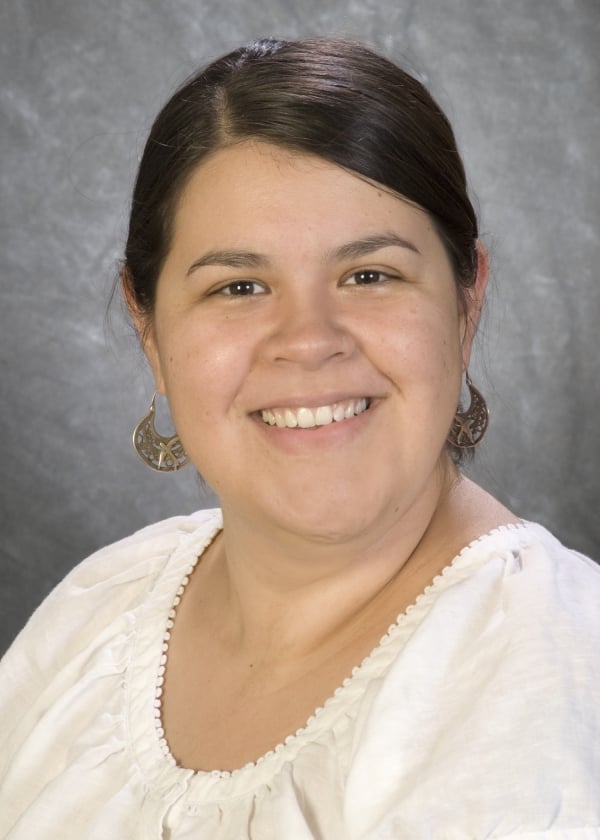
University of Arizona
“There were some Jewish students who were disturbed by the lesson, and there were some other students who were not disturbed by it and wanted to defend the instructors, so I think that caused some friction among the students,” Marx said.
“There are limits to free speech within academic freedom—that is, you have to stick with what your expertise is and you have to stay within the curriculum,” he said. He conceded, “that’s a fuzzy set; it’s not black and white.”
“These are things for which reasonable people will have a dispute, and that was the point of the investigation,” he said.
PEN America issued a statement on this situation, saying that, even though the employees were reinstated, the fact that they still couldn’t teach the class upon returning represented a “fundamental violation of academic freedom.”
“We want to be careful about rendering judgment first and looking at evidence later,” Shahverdian said.
Miriam Elman, of the Academic Engagement Network, a pro-Israel faculty and administrator organization, advocates for limits on speech within classrooms that’s not germane to the course. She said there’s a “power differential” between the “captive audience” of students and the professor and “no one has an academic freedom right to teach a particular course.”
‘An Alarming Rate’
Multiple groups that support faculty free expression and academic freedom told Inside Higher Ed that they don’t have tallies of how many Israel-Palestine–related faculty investigations and disciplinary actions have taken place since Oct. 7. The above anecdotes involve seven campuses in five states.
“For sure, there’s no question in my mind that the violations of academic freedom have increased,” said Irene Mulvey, president of the American Association of University Professors. She said AAUP members are reporting situations across the country, but “we don’t have the capacity to track it.”
“Incidents are happening at an alarming rate, and faculty are holding the line and trying to get their administrations to hold the line for academic freedom in polarizing times,” Mulvey said. She said the AAUP’s stance is that a faculty member’s statement as a citizen can’t be grounds for firing unless it clearly demonstrates that faculty member’s unfitness for his or her position.
The AAUP released a statement last month that itself reiterated one from last year on the pitfalls of “overly broad definitions of antisemitism.” Last month’s statement added that the AAUP “rejects the characterization of pro-Palestinian speech or critiques of the Israeli state as invariably antisemitic … These efforts to control what is thought, said, taught, and researched are antithetical to the educational mission of a university and the democratic values upon which it rests.”
Sometimes, faculty members’ speech is said to cause harm or even endanger people on campus.
“Safety for all members of campuses is paramount,” Mulvey told Inside Higher Ed. “Allegations of antisemitism or Islamophobia or the like, they need to be investigated or adjudicated … but an institution should not use safety concerns as a pretext for censorship or to stifle academic freedom.”
“Our position is the antidote for this kind of problem is more speech,” she said. “You’ve got to talk about it.”
FIRE broadly advocates for free expression. It counsels against even investigating protected speech, saying that investigations themselves, outcome notwithstanding, can violate the First Amendment.
“Where the speech is clearly protected, we’ve got ourselves a bright line. The university cannot and should not investigate protected speech,” said Alex Morey, FIRE’s campus rights advocacy director, in an email. “That said, too many administrators don’t know how to recognize protected speech. College administrators need to understand that the First Amendment on public campuses, and institutional free speech promises on most private ones, [protect] speech or opinions lots of people may find hateful, upsetting, offensive, racist, antisemitic and so on.”
But she wrote that “proper investigations, with all due process protections” can be helpful when they’re investigations into unprotected speech, such as “true threats.”
“When it comes to true threats analyses specifically, those are always very fact-intensive analyses,” she wrote. “What was said? How was it said? What’s the context in which it was said? How long was it said for? And even, what was in the mind of the speaker? Did they intend to threaten or did they speak recklessly such that listeners would perceive a threat?”
Elman, of the Academic Engagement Network, said she supports much more free rein on social media than in classrooms.
“Outside the classroom, that kind of speech, that’s in the public domain,” she said. “Faculty should have the freedom to speak as citizens.”
She advocates for something some others have rejected: university leaders condemning certain faculty speech.
“We advocate for the university to be the moral compass, the leadership to say, ‘I find that speech morally reprehensible,’” Elman said. “It’s in a sense the same thing they should do when it comes to students and their hate speech.” She said university leaders’ role “should be to say that this speech crosses the line into antisemitism or Islamophobia or anti-Black racism.”
Shahverdian, of PEN America, said university leaders can uphold faculty free expression while simultaneously issuing statements to condemn certain speech. “When they decide to do so is both up to them and should be very carefully considered,” she said, noting they can run the risk of commenting on too many situations and being expected to continue doing so.
The Academic Freedom Alliance’s Whittington, on the other hand, said he tends to think “universities would be better off if they did not issue so many statements.” Presidents, he said, “are always speaking in ways that have consequences for the institution.”
Adam Goldstein, vice president of strategic initiatives for FIRE, tied the current controversy to a phenomenon independent of the Israel-Palestine conflict, and broader than just universities.
“Now there’s nonnegligible sections of the country that believe the First Amendment goes too far,” he said.
Some faculty free speech advocates say universities are more likely to punish faculty members for their speech because their power on campus has diminished over the years. Higher education today has seen politicians become presidents of prominent universities and a shrinking share of professors with tenure, the job protection that is supposed to provide faculty members greater assurance that they won’t be fired for their speech. And local faculty senates and national organizations have decried the erosion of shared governance between faculty members and administrators, especially as universities respond to financial pressures with program cuts.
Goldstein said this diminishing power of faculty members in leading universities contributed to the threats of this moment.
“With the stage of students advocating for less speech and faculty with less authority within the institutions,” he said, “it hasn’t been the easiest time to be a faculty member.”

